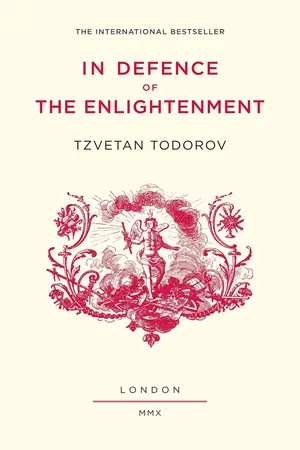![]()
Notes
1 TN: The French term for the Enlightenment, les Lumières, literally means ‘the lights’.
2 Turgot, Tableau philosophique des progrès successifs de l’esprit humain (1750) (Paris: Calmann-Lévy, 1970), 12.
3 Rousseau, Discourse on the Origin and Foundations of Inequality Among Men (1755), The Discourses and Other Early Political Writings, ed. Victor Gourevitch (Cambridge University Press, 1997), 159, 167, 184, 138.
4 TN: Todorov is referring to the murder of Sohane Benziane, 17, in October 2002 in the Parisian suburb of Vitry by an 18-year-old boy who doused her with petrol and set her on fire because she snubbed his advances.
5 Rousseau, ‘Lettre sur la vertu, l’individu et la société’, Annales de la société Jean-Jacques Rousseau 16 (1997), 325.
6 Online source: www.jstor.org/sici?sici=0022-5037 (198601%2F03)47%3A1%3C61%3AMPOH%3E2.0.CO%3B2-6
7 Montesquieu, The Spirit of Laws, trans. Thomas Nugent (New York and London: Hafner Publishing Company, 1966), 3.
8 De Bonald, Législation primitive (Paris: Adrien Le Clère, 1829), volume 1, 250.
9 Montesquieu, ‘Letter to the Marquis de Stanville’ (27 May 1750), Œuvres complètes (Paris: Nagel, 1955), volume 3; Rousseau, ‘Letter to Beaumont’ (1762), Œuvres complètes (Paris: Gallimard, 1969), volume 4, 996.
10 Condorcet, Outlines of an historical view of the progress of the human mind: being a posthumous work of the late M. de Condorcet (Philadelphia: Lang and Uftick, 1796), 253–4.
11 Leroy-Beaulieu, De la colonisation chez les peuples modernes, 1902, volume 1, xxi, vii.
12 Ferry (1885), Discours et opinions 1893–1898 (Paris: Armand Colin & Cie), volume 5, 211.
13 Bugeaud, Par l’épée et par la charrue – écrits et discours (Paris: PUF, 1948), 68.
14 Tocqueville (1846), Œuvres complètes (Paris: Gallimard, 1962), volume 1, 299.
15 Ferry, Discours et opinions 1893–1898, volume 5, 209.
16 Eliot, The Idea of a Christian Society (London: Faber and Faber, 1940), 63.
17 Solzhenitsyn, online source: http://www.columbia.edu/ cu/augustine/arch/solzhenitsyn/harvard1978.html
18 John Paul II, Memory and Identity: Conversations at the Dawn of a Millennium (New York: Rizzoli, 2005), 10, 110.
19 Solzhenitsyn, op. cit.
20 John Paul II, Memory and Identity, 48, 134–5.
21 Montesquieu, Treatise on Duties, online source: http://books.google.com/books?id=x-vDjpV0vrQC&pg= PA179&lpg=PA179&dq=montesquieu+justice+ %22human+laws%22+existence+reasonable& source=web&ots=LQ-2MUT8br& sig=78UDHKwikIGD445iSl4qwL8OdHA&hl=en& sa=X&oi=book_result&resnum=3&ct=result; The Spirit of Laws,19.
22 See page 72.
23 Rousseau, Discours sur l’économie politique (1756), Œuvres complètes, volume 3, 248; Diderot, ‘Éclectisme’, Encylopédie, this translation from online source: http://books.google.com/ books?id=5Up1LRv6k3AC&pg=PA122&lpg=PA122&dq= diderot+encyclopedie+eclecticism+philosopher+tradition+ %22universal+consent%22&source=web&ots=7e35y1ayO7&sig= aK6S8k7_UVj2rw5ouDy8v3aYBEc&hl=en&sa=X&oi= book_result&resnum=4&ct=result
24 Kant, ‘An Answer to the Question: What is Enlightenment?’ (1784), What is the Enlightenment? Eighteenth-Century Answers and Twentieth-Century Questions, ed. James Schmidt (Berkeley: University of California Press, 1996), 58; ‘What is Orientation in Thought?’, Kant: Political Writings, ed. H. S. Reiss (Cambridge University Press, 1970), 249.
25 Diderot, ‘Fait’, Encylopédie; Condorcet, Cinq mémoires sur l’instruction publique (1791) (Paris: Garnier-Flammarion, 1994), 257; Kant, The Critique of Pure Reason, trans. J.M.D. Meiklejohn (Dodo Press, 2007), preface to the first edition.
26 Montesquieu, The Spirit of Laws,154.
27 Rousseau, An inquiry into the nature of the social contract, or, Principles of political right (1762), ‘The Social Contract’ and Other Later Political Writings, ed. Victor Gourevitch (Cambridge University Press, 1997), III, I and II, 6.
28 Hume, A Treatise on Human Nature (1739), online source: http://ebooks.adelaide.edu.au/h/hume/david/h92t/B2.3.3.html
29 Rousseau, Dialogues (1772–6), The Collected Writings of Rousseau (Hanover and London: University Press of New England, 1990), volume 1, 118.
30 Rousseau, The Discourses,185.
31 Sade, Justine, Philosophy in the Bedroom, and Other Writings, trans. Richard Seaver and Austryn Wainhouse (New York: Grove Weidenfeld, 1965), 283–4.
32 Blanchot, Lautréamont and Sade, trans. Stuart and Michelle Kendall (Stanford University Press, 2004), 10, 37.
33 Bata...
